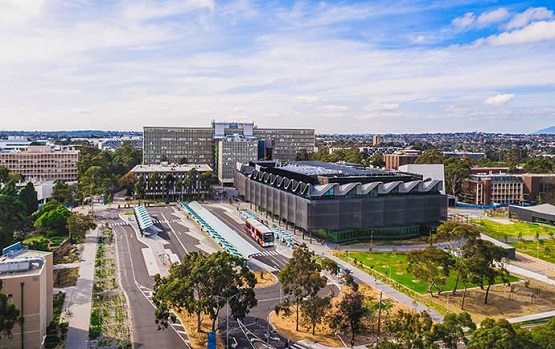Monash University awarded $11 million to accelerate Net Zero Initiative
Monash University will strive to eliminate fossil fuel dependency, deliver super-efficient buildings, and power its Victorian campuses with 100 per cent renewable energy by 2030, supported by $11 million in funding from the Victorian Government.
Announced today by the Minister for Higher Education, Gayle Tierney, and the Minister for Energy Environment and Climate Change, Lily D’Ambrosio, the funding is part of the Victorian Higher Education State Investment Fund (VHESIF), and will accelerate the University’s Net Zero Initiative.
The funding will support a multi-year physical and digital transformation of the University’s Victorian campuses to drive cost savings and eliminate emissions. This includes powering heating and cooling systems with electricity at the Clayton campus to reduce natural gas consumption.
It will also fund the upgrade of Monash’s building control systems at Clayton, Caulfield, Parkville and Peninsula. This will enable AI-driven energy efficiency and grid interaction to reduce energy consumption, and accelerate the uptake of renewable energy on campus and in the broader energy network.
The creation of a digital education, innovation and operating platform that will showcase solutions, and stimulate industry and research collaboration in the development and commercialisation of digital innovation and net zero solutions, will also be supported. This will build on the University’s and its partners’ vision and planning to transform the Monash Technology Precinct into a world-leading net zero precinct in the future.
President and Vice-Chancellor Professor Margaret Gardner AC said: “We are delighted to work with the state government to accelerate our Net Zero Initiative, and we thank the government for this significant investment.
“In line with Monash’s strong commitment towards climate change and making a positive impact through our research, education and operations, the University aims to showcase solutions that will help increase productivity and stimulate investment to deliver net zero emissions,” said Professor Gardner.
Net Zero Initiative Program Director Scott Ferraro said: “This funding will help us shift away from natural gas by electrifying our building stock, use digital tools to improve their energy efficiency, and dynamically control our energy use to support the shift to 100 per cent renewables.”
Professor Ariel Liebman, Monash Energy Institute Director and Professor of Sustainable Energy Systems in the Faculty of Information Technology, said: “We are excited about the prospect of using the physical and digital infrastructure deployed through this project in our research programs. It will enable Monash to enhance the Net Zero Initiative’s microgrid living lab research, develop solutions to climate change and the energy transition, and nurture leaders of the future.”
In 2020, Monash had reduced its emissions compared to a 2015 baseline by 40 per cent, sourced 55 per cent of its electricity from renewables, and undertook a range of related research through the Monash Energy Institute.
The University’s leadership, in pursuing net zero emissions, aims to support the creation of about 100 jobs in the energy efficiency and construction industries.
This announcement follows the University’s funding allocations through the VHESIF for its Safe and Equal @ Work and Access to Justice programs, smart manufacturing, and research and development commercialisation and Victoria’s Health Innovation Centre.

